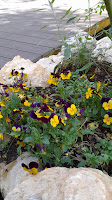We were not in Jerusalem for Shushan Purim this year. Instead, I ventured just a short distance from Afula to a place referred to in the Books of the Prophets as "Shunam", today called "Sulam" by its entirely Arab population.
And what exactly was a nice Jewish girl like me doing in an entirely Arab village on Shushan Purim? Visiting the home of the Isha HaShunamis (the Shunamite Woman), of course. Or at least where her home once stood. (Some say it is her burial place but my very knowledgeable guide insisted otherwise.) Who was this woman and what drew me to the place where she lived more than 2,500 years ago?
I'm going to take the easy way out of answering the first part of that question by providing links to articles about the Isha HaShunamis (see below). As for why I went, well, why not? Like so many other holy places in Israel, to visit them is to connect not just with our ancient history but with the sparks of spirituality that remain from the particular personality who long ago left this world. The Isha HaShunamis was a holy woman who was kind and hospitable to the navi (prophet) Elisha who, in turn, promised that she and her husband would finally be blessed with a child. After Elisha literally revived that child from death (see Melachim II - the second Book of Kings, chapter 4, verses 8-37), the boy grew up to become the navi Chabakuk.
As we hiked down a rocky slope
I wondered if I was retracing the footsteps of Elisha himself. Then, to reach the place where that holy woman lived and raised another of our holy prophets was nothing short of awesome. I joined my guide and his three young sons in saying Tehillim (reciting Psalms), with extra emphasis on praying for couples I know who have not yet had a child. Rabbi Chaim Kanievsky, of (recent) blessed memory, and his saintly father, the Steipler Gaon, were both known to come here to pray for childless couples and advised them to make the pilgrimage themselves. There are many stories of miraculous results...

When I Remember Jerusalem, I often think about the Shushan Purims we celebrated there - and now, I will think about my recent Shunam Purim adventure as well.
I hope my Pre-Purim Procrastination was a nice break for you, too. But all nice breaks must come to an end. With rag and cleaning products in hand, I extend my warmest wishes to you and yours for a Chag Pesach Kasher v'Sameyach - a very happy, holy Pesach. As we enter into this season of redemption (with the month of Nissan beginning tonight), may the words of the navi Chabakuk finally come true. Amen.
For more about the Isha HaShunamis:
https://mishpacha.com/woman-
https://www.jewishpress.com/







.JPG)










